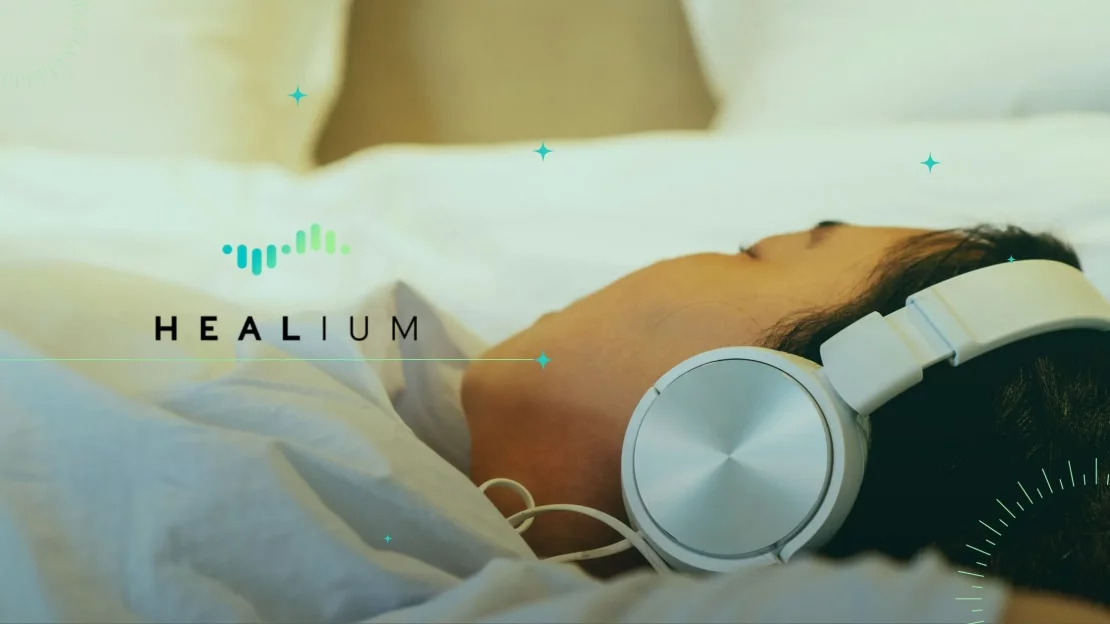




Does music really help you sleep? We’ve dug deep to answer your questions and even provide tips on incorporating music into your sleep routine.

Sleeping is vital for our health and well-being, yet many find it challenging to get a good night’s sleep. Maybe you’re tossing and turning all night, trying your hardest to switch your mind “off”, but nothing works, despite the wide variety of solutions on the market today.
But what about sleep meditation music? How does listening to music while sleeping affect you?
Meditation music for sleep can be a powerful sleep aid. Studies have shown that music can help reduce anxiety, improve sleep quality, and promote relaxation.
One study found that sleep meditation music helped people with insomnia fall asleep faster and sleep more soundly. The participants who listened to sleep meditation music also had less daytime sleepiness and felt more rested after sleep.
In this article, we’ll explore the benefits of sleep meditation music as well as answer common questions like: “How does music help you sleep?”
In general, music has a calming effect on the mind and body, which can lead to improved sleep. Music can help reduce anxiety, lower blood pressure, and slow heart rate. All of these effects can promote better sleep.
Music can also help to mask background noise that may be keeping you awake. If you live in a noisy environment or have trouble sleeping in silence, playing soft music may help you fall asleep and stay asleep.
In addition, music can have different effects on your brainwaves, depending on the type of music you listen to. Slow, relaxing music can help increase alpha and reduces beta activity brainwaves, which are associated with deep sleep states. In one study, adults who listened to 45 minutes of slow music before bedtime fell asleep faster and had better sleep quality than those who didn’t listen to music.
In addition to directly promoting sleep, music can also have other effects on the brain that indirectly promote sleep. For instance, music can:
– Improve mood – Music can boost your mood and improve your outlook on life.
– Reduce stress – Listening to music can help reduce stress and anxiety.
– Alleviate pain – One study found that music can help reduce pain in cancer patients.
– Enhance memory – Music can improve memory, especially in older adults.
– Boost cognitive performance – Listening to music can help you focus and improve your performance on task-oriented tasks.
– Improve exercise performance – Music can help you work out longer and harder.
The effects of music on the brain are still being studied, but there are a few theories about why music has these effects.
One theory is that music activates the release of dopamine in the brain. Dopamine is a neurotransmitter that helps regulate mood and emotion. It’s also involved in the reward center of the brain, which may explain why music can boost mood and improve cognitive performance.
Another theory is that music reduces stress by promoting relaxation. When we’re stressed, our bodies go into fight-or-flight mode, which releases stress hormones like cortisol. Music can help reduce cortisol levels and promote relaxation.
So, what type of music is best for sleep? Our favorite option is typically relaxing music, with a slow tempo and no lyrics.
However, the truth is that the best music for sleep is any type of music that can help you relax, calm down and feel comfortable.
We prefer music with a slow tempo can help slow down your heart rate and breathing, which can lead to a more relaxed state. Music without lyrics can also be helpful, as it won’t distract you with words or stories.
There are many different genres of music that can be effective for sleep, including classical, jazz, ambient, and electronic music. If you’re not sure where to start, many online streaming services offer collections of sleep-inducing music.
Keep in mind: When choosing music for sleep, it’s important to find something that you enjoy and that doesn’t make you feel anxious or stressed.
Everyone is different, so what works for one person may not work for another. If you’re having trouble finding the right music, it’s worth trying out a few different genres and artists to see what works best for you.
More importantly, make sure to listen to the music at a volume that is comfortable for you. If the music is too loud, it can actually do more harm than good and make it harder to fall asleep.
If you find that music helps you sleep, there are a few ways to incorporate it into your nightly routine.
– One option is to listen to music as you’re falling asleep. This can be done by using a bedside player, streaming music from your smartphone, or even playing music through a small portable speaker.
– If you have trouble falling asleep, you may want to try a guided meditation or relaxation program that uses music. There are many of these programs available online and on mobile apps. Guided sleep meditations can help to clear your mind and relax your body, making it easier to fall asleep.
– Listening to music before bed can also be a great way to wind down and prepare for sleep. It can also be used as a tool to help you fall asleep and stay asleep throughout the night.
The key is to become more aware (and listen to) your own body. Pay special attention to the genres of music that lead to higher levels of relaxation, and begin incorporating that music into your routine as you wind down for bed.
Combining music with meditation is an effective way to improve sleep quality. Music can help to calm the mind and body, and allow the listener to drift off into a deep sleep.
At Healium, we specialize in sleep meditation experiences, and have paid special mind to the audio we include in the background of each of our virtual reality stories.
You can take a journey into the world of sleep meditation with these virtual and augmented reality stories.
Tree of Life is our featured experience. In this experience, you will be transported to a serene forest where you can relax and recharge.
Other favorite stories and experiences include:
– Journey to the Center of Brain
To experience these and other sleep meditation stories, download the Healium app today. It is available on iOS and Android, as well as in virtual reality.
Music can be a helpful tool for sleep, both for falling asleep and staying asleep throughout the night. It’s important to find music that you enjoy and that doesn’t make you feel anxious or stressed.
And, make sure to listen at a comfortable volume.
If you have trouble sleeping, you may want to try a guided meditation or relaxation program that uses music.
{“@context”:”https://schema.org”,”@type”:”FAQPage”,”mainEntity”:[{“@type”:”Question”,”name”:”Does Music Help You Sleep?”,”acceptedAnswer”:{“@type”:”Answer”,”text”:”Studies have shown that music can help reduce anxiety, improve sleep quality, and promote relaxation. One study found that sleep meditation music helped people with insomnia fall asleep faster and sleep more soundly. The participants who listened to sleep meditation music also had less daytime sleepiness and felt more rested after sleep.\n\n\n”}},{“@type”:”Question”,”name”:”How Does Listening to Music While Sleeping Affect You?”,”acceptedAnswer”:{“@type”:”Answer”,”text”:”Music reduces stress by promoting relaxation. When we’re stressed, our bodies go into fight-or-flight mode, which releases stress hormones like cortisol. Music can help reduce cortisol levels and promote relaxation.\n”}}]}
Sarah Hill, a former interactive TV news journalist at NBC, ABC, and CBS affiliates in Missouri, gained recognition for pioneering interactive news broadcasting using Google Hangouts. She is now the CEO of Healium, the world’s first biometrically powered VR/AR channel, helping those with stress, anxiety, insomnia, and other struggles through biofeedback storytelling. With patents, clinical validation, and over seven million views, she has reshaped the landscape of immersive media.